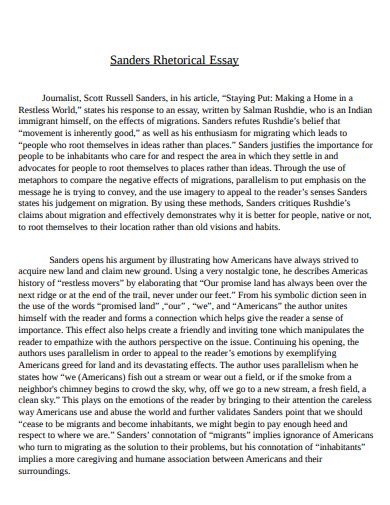In the realm of effective communication, rhetorical essays stand out as persuasive pieces that harness the power of language to shape opinions and influence audiences. Rhetorical analysis, a key element of critical thinking, involves dissecting the strategies employed by writers to evoke emotions, establish credibility, and drive home their arguments. By examining exemplary rhetorical essays, we can glean valuable insights into the art of persuasive writing.

Revisiting the Classics: Martin Luther King Jr.’s “I Have a Dream”
Martin Luther King Jr.’s “I Have a Dream” speech, delivered in 1963 at the Lincoln Memorial in Washington, D.C., is a timeless example of rhetorical brilliance. King’s use of vivid imagery, literary devices, and emotional appeals paints a compelling vision of a society free from racial prejudice and discrimination.
One striking rhetorical strategy employed by King is the anaphora, a repetition of words or phrases at the beginning of successive clauses or sentences. In the iconic line, “I have a dream that one day this nation will rise up and live out the true meaning of its creed: ‘We hold these truths to be self-evident, that all men are created equal,'” King’s anaphora emphasizes the urgency and importance of his message.
Furthermore, King’s speech is replete with powerful metaphors and similes. He compares the struggle for civil rights to a “mighty stream of justice” that cannot be stopped. He draws parallels between the oppressive forces of segregation and the “dark clouds of racial prejudice.” These vivid comparisons create a strong emotional connection with the audience, making them more receptive to his arguments.
Contemporary Applications: Persuasive Essay on Environmental Sustainability
In the contemporary era, the need for persuasive writing extends to a wide range of issues, including environmental sustainability. Here’s an example of a rhetorical essay that tackles this pressing issue:
In the face of a global climate crisis, it is imperative that we prioritize environmental sustainability. This essay argues that a shift towards clean energy sources, coupled with responsible consumption habits, is crucial for preserving our planet’s health and ensuring a sustainable future for generations to come.
The essay employs a combination of ethos, pathos, and logos to persuade the reader. It cites credible scientific data to establish the gravity and urgency of climate change. The writer also draws on personal anecdotes and emotional appeals to elicit empathy and concern from the audience. By addressing both the rational and emotional dimensions of the issue, the essay effectively drives home the message of environmental responsibility.
Case Study: Analyzing a Marketing Pitch
Rhetorical analysis can also be applied to marketing materials, where persuasive techniques aim to influence consumer behavior. Consider the following example:
A marketing pitch for a new smartphone highlights its cutting-edge features, superior performance, and stylish design. The pitch employs rhetorical strategies such as hyperbole, metaphor, and repetition to create a sense of urgency and desire. The writer repeatedly emphasizes the smartphone’s “lightning-fast speed” and “unmatched capabilities,” leaving a lasting impression on potential customers.
By understanding the rhetorical devices used in marketing campaigns, consumers can become more discerning in their decision-making and make choices that align with their values and needs.
Tabular Representation of Rhetorical Strategies
For ease of understanding, here’s a tabular representation of common rhetorical strategies:
| Strategy | Definition | Example |
|---|---|---|
| Anaphora | Repetition of words or phrases at the beginning of clauses or sentences | “I have a dream that…” |
| Metaphor | A comparison of two unlike things without using “like” or “as” | “The struggle for civil rights is a mighty stream of justice.” |
| Simile | A comparison of two unlike things using “like” or “as” | “Segregation is like a dark cloud of racial prejudice.” |
| Hyperbole | A deliberate exaggeration or overstatement | “This smartphone is the fastest on the planet!” |
Effective Strategies for Persuasive Writing
To craft effective rhetorical essays, consider employing the following strategies:
- Establish a Strong Thesis: Clearly articulate your main argument and support it throughout the essay.
- Research and Cite Credible Sources: Support your claims with facts, statistics, and quotes from experts.
- Use a Variety of Rhetorical Strategies: Engage your audience through a combination of literary devices, emotional appeals, and logical arguments.
- Maintain a Clear and Coherent Structure: Organize your essay logically with an introduction, body paragraphs, and a conclusion.
- Proofread and Revise Carefully: Ensure your essay is free of errors and that your arguments are presented in the most compelling manner.
Step-by-Step Approach to Rhetorical Analysis
To analyze rhetorical essays effectively, follow these steps:
- Read the Essay Closely: Pay attention to the language, structure, and arguments presented.
- Identify Rhetorical Strategies: Note the use of literary devices, emotional appeals, and logical reasoning.
- Analyze the Audience: Consider the intended audience and how the writer adapts their message accordingly.
- Evaluate the Effectiveness: Assess the impact of the rhetorical strategies on the reader’s perspective and decision-making.
Frequently Asked Questions (FAQs)
1. What is the purpose of a rhetorical essay?
A rhetorical essay aims to persuade, inform, or convince the reader by employing persuasive techniques and literary devices.
2. What are the key elements of a rhetorical essay?
A strong thesis, credible sources, effective rhetorical strategies, a clear structure, and careful proofreading are essential elements.
3. How can I improve my rhetorical essay writing skills?
Read exemplary essays, study rhetorical strategies, practice writing, and seek feedback from others.
4. What are some common pitfalls to avoid in rhetorical essays?
Lack of a clear thesis, unsupported claims, poorly organized structure, and excessive bias should be avoided.
5. How can I use rhetorical analysis in everyday life?
Rhetorical analysis helps us understand persuasive techniques used in marketing, politics, and other areas, enabling us to make more informed choices.
6. What are some emerging trends in rhetorical analysis?
Scholars are exploring the use of digital media, social media, and artificial intelligence in shaping public discourse.
